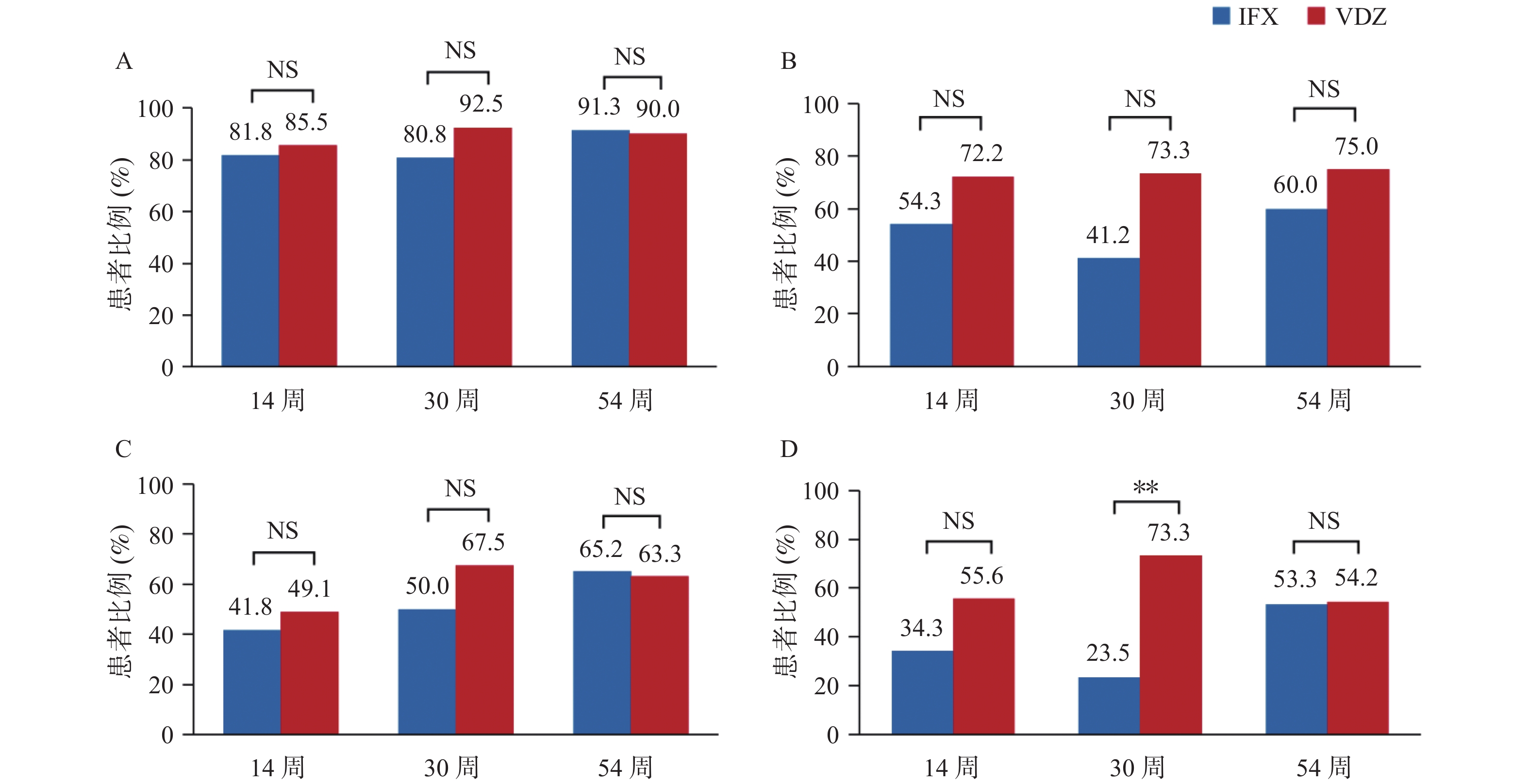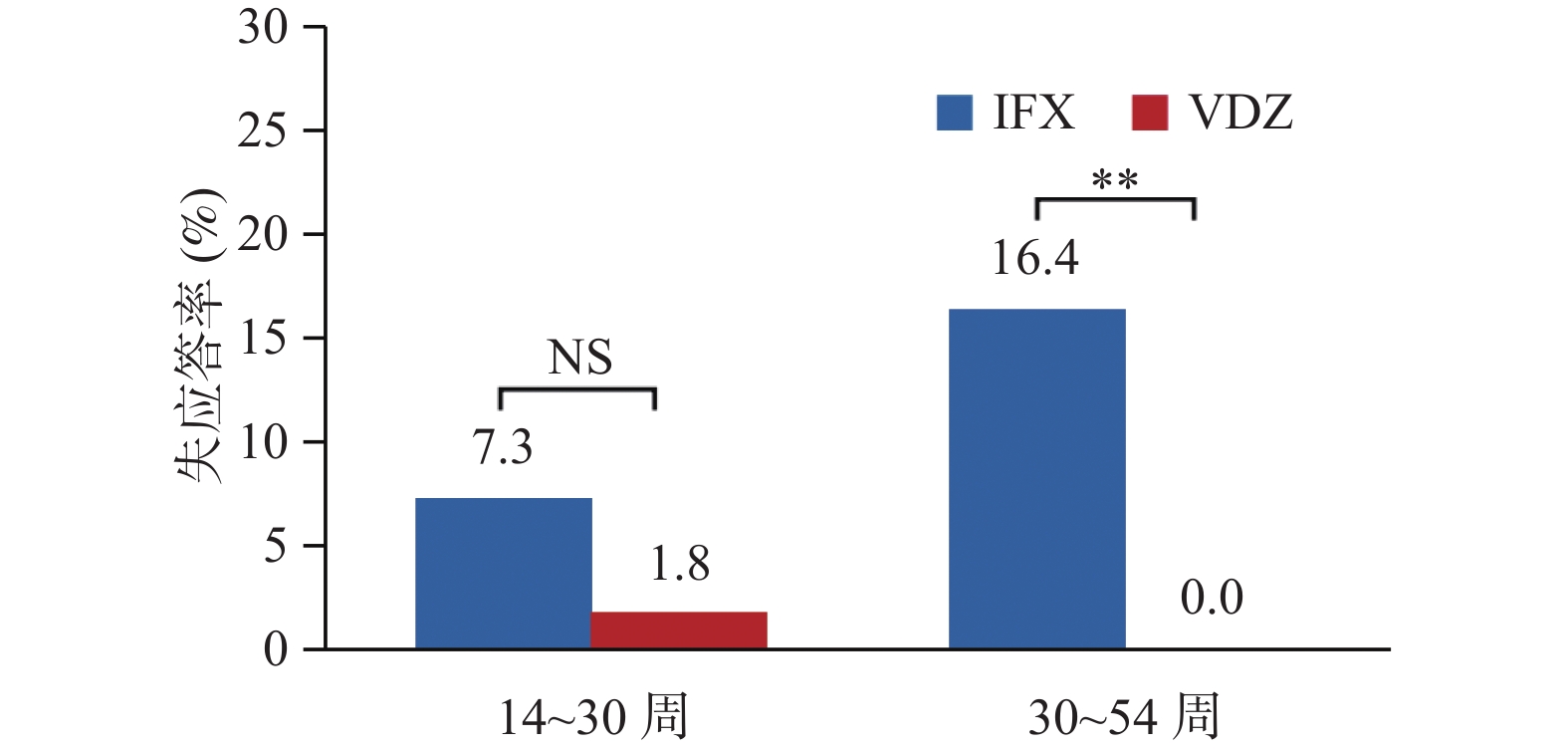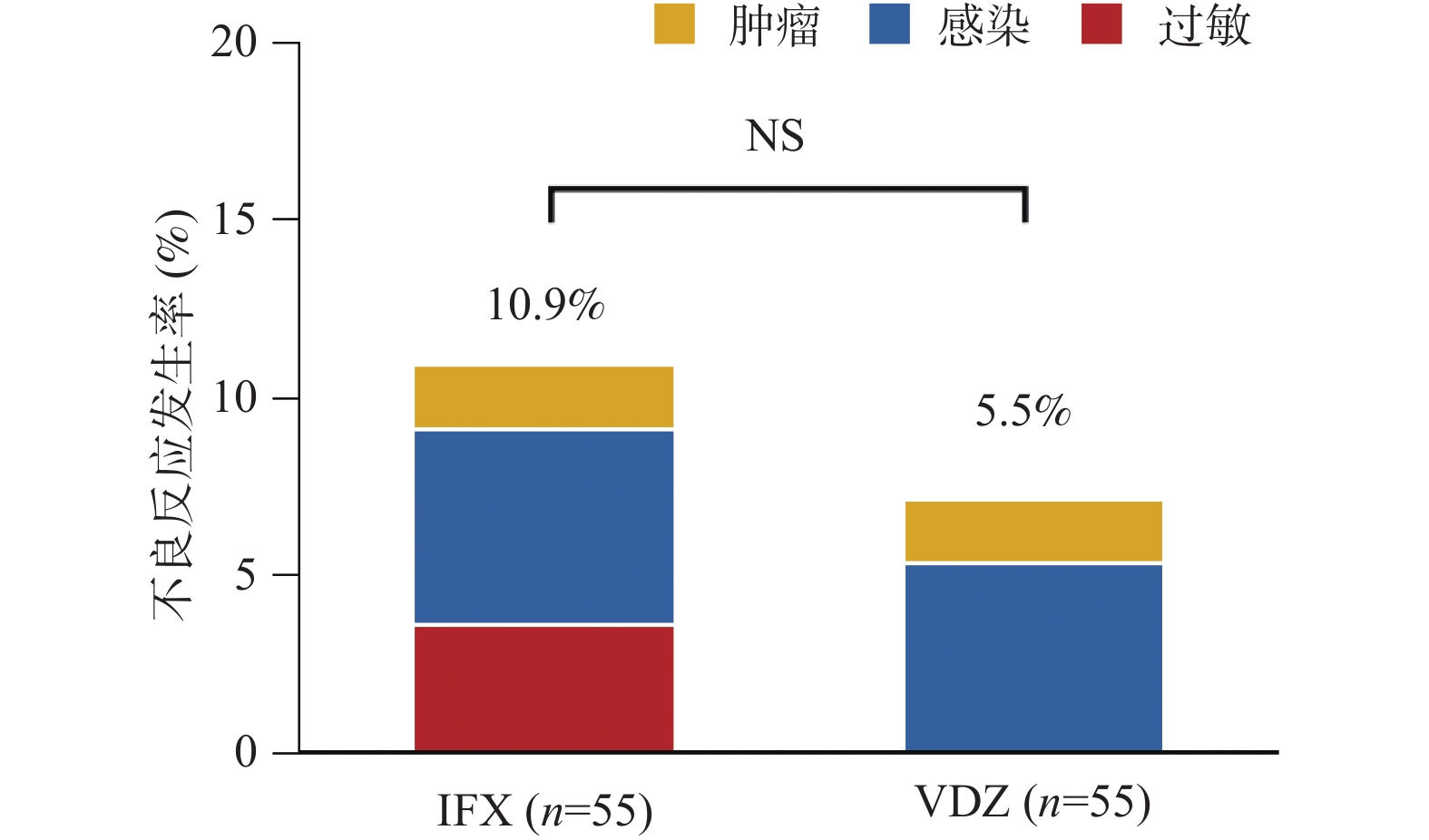Retrospective Cohort Study of Infliximab and Vederizumab in the Treatment of Moderate-to-severe Ulcerative Colitis
-
摘要:
目的 比较英夫利西单抗(infliximab,IFX)及维得利珠单抗(vedolizumab,VDZ)在中重度溃疡性结肠炎(ulcerative Colitis,UC)治疗中的疗效及安全性差异。 方法 回顾性收集自2020年01月至2023年12月于昆明医科大学第一附属医院确诊为中重度UC并使用IFX/VDZ治疗的患者110例,其中IFX治疗组55例,VDZ治疗组55例。记录患者在治疗前(0周)及治疗14周、30周、54周的临床症状、疾病活动相关指标、内镜表现以及治疗过程中发生的不良反应,分析2种药物对于中重度UC治疗的疗效及安全性是否存在差异。 结果 2组患者在各项基线指标之间无显著差异(P > 0.05);IFX治疗组的炎症指标(WBC、PLT、ESR、CRP)水平在第14周高于VDZ治疗组,营养指标ALB水平在第30周低于VDZ治疗组,其差异具有统计学意义(P < 0.05);其余实验室指标在各随访节点之间的差异无统计学意义(P > 0.05)。IFX治疗组及VDZ治疗组的临床应答率在治疗第14周(81.8% vs 85.5%)、第30周(80.8% vs 92.5%)及第54周(91.3% vs 90.0%)无显著差异(P > 0.05);临床缓解率在治疗第14周(41.8% vs 49.1%)、第30周(50.0% vs 67.5%)及第54周(65.2% vs 63.3%)无显著差异(P > 0.05);内镜应答率在治疗第14周(54.3% vs 72.2%)、第30周(41.2% vs 73.3%)及第54周(60.0% vs 75.0%)无显著差异(P > 0.05);内镜缓解率在治疗第14周(34.3% vs 55.6%)及第54周(53.3% vs 54.2%)无显著差异(P > 0.05),IFX治疗组的内镜缓解率在治疗第30周(23.5% vs 73.3%)低于VDZ治疗组,其差异具有统计学意义(P = 0.005)。IFX治疗组与VDZ治疗组的失应答率在治疗14周至30周期间 (7.3% vs 1.8%)无显著差异(P > 0.05),IFX治疗组的失应答率在治疗第30周至54周期间(16.4% vs 0)高于VDZ治疗组,其差异具有统计学意义(P = 0.005);IFX治疗组及VDZ治疗组不良反应发生率(10.9% vs 5.5%)之间差异无统计学意义(P > 0.05)。 结论 在中重度UC的治疗中,IFX治疗组与VDZ治疗组在第14周、54周的临床应答率及临床缓解率、内镜应答率、内镜缓解率之间未观察到显著差异,在第30周IFX治疗组的内镜缓解率低于VDZ治疗组;维持治疗过程中IFX治疗组的失应答率高于VDZ治疗组,提示IFX治疗组可能存在更高的远期耐药率;两药物治疗过程中的不良反应发生率之间无显著差异。 Abstract:Objective To compare the efficacy and safety of Infliximab (IFX) and Vedolizumab (VDZ) in the treatment of moderate-to-severe ulcerative colitis (UC). Methods A total of 110 patients diagnosed with moderate-to-severe ulcerative colitis and treated with IFX/VDZ in the First Affiliated Hospital of Kunming Medical University from January 2020 to December 2023 were retrospectively collected. Including 55 in the IFX treatment group and 55 in the VDZ treatment group. Clinical symptoms, indicators related to disease activity, endoscopic manifestations and adverse reactions occurred during treatment were recorded before treatment (0 weeks) and 14, 30, and 54 weeks of treatment, and whether there were differences in the efficacy and safety of the two drugs in the treatment of moderate to severe UC was analyzed. Results There were no significant differences in baseline indexes between the two groups (P > 0.05). The levels of inflammatory indicators (WBC, PLT, ESR, CRP) in IFX treatment group were higher than those in VDZ treatment group at week 14, and the level of nutrition indicator ALB was lower than those in VDZ treatment group at week 30, with statistical significance (P < 0.05). There was no significant difference in other laboratory indexes among follow-up time points (P > 0.05). The clinical response rate of IFX treatment group and VDZ treatment group was not significantly different at week 14 (81.8% vs 85.5%), week 30 (80.8% vs 92.5%) and week 54 (91.3% vs 90.0%) (P > 0.05). There was no significant difference in clinical response rate at week 14 (41.8% vs 49.1%), week 30 (50.0% vs 67.5%) and week 54 (65.2% vs 63.3%) (P > 0.05). There was no significant difference in endoscopic response rate at week 14 (54.3% vs 72.2%), week 30 (41.2% vs 73.3%) and week 54 (60.0% vs 75.0%) (P > 0.05). There was no significant difference in the endoscopic remission rate at week 14 (34.3% vs 55.6%) and week 54 (53.3% vs 54.2%) (P > 0.05). The endoscopic remission rate at week 30 (23.5% vs 73.3%) in IFX treatment group was lower than that in VDZ treatment group, the difference was statistically significant (P = 0.005). There was no significant difference between IFX group and VDZ group (7.3% vs 1.8%) during 14 to 30 weeks of treatment (P > 0.05), and IFX group had higher non-response rate during 30 to 54 weeks of treatment (16.4% vs 0) than VDZ group. The difference was statistically significant (P = 0.005). There was no significant difference in the incidence of adverse reactions between IFX treatment group and VDZ treatment group (10.9% vs 5.5%) (P > 0.05). Conclusion During the treatment of moderate to severe UC, no significant difference was observed in the clinical response rate, clinical remission rate, endoscopic response rate and endoscopic remission rate between the IFX treatment group and the VDZ treatment group at week 14 and week 54, and the endoscopic remission rate in the IFX treatment group was lower than that in the VDZ treatment group at week 30. The non-response rateof IFX treatment group was higher than that of VDZ treatment group during maintenance treatment, suggesting that IFX treatment group may have a higher long-term drug resistance rate. There was no significant difference in the incidence of adverse reactions between the two drugs. -
Key words:
- Ulcerative colitis /
- Retrospective cohort study /
- Biological agent /
- Infliximab /
- Vedelizumab
-
溃疡性结肠炎(ulcerative colitis,UC)是一种以结直肠受累为主要表现的慢性非特异性炎症性疾病,是炎症性肠病(inflammatory bowel disease,IBD)的主要类型之一,目前全球患病率约500万例,且发病率呈逐年上升趋势[1−2]。其发病机制尚未完全明确,可能受遗传变异、环境及饮食、肠道微生态及粘膜免疫失调等多重因素影响[3]。其以复发和缓解交替出现为主要临床特点,主要破坏肠道产生粘液血便、腹痛等消化道症状,同时可有关节损伤、皮肤黏膜表现、眼部病变、肝胆疾病、血栓栓塞性疾病等一系列肠外表现,并可出现中毒性巨结肠、肠穿孔、下消化道大出血、上皮内瘤变以及癌变等并发症[4]。有研究报道约8%至30%的UC患者对药物治疗无反应并最终需要行结肠切除术治疗,给患者造成了巨大的精神压力及经济负担[5−6]。中重度UC患者需要早期积极治疗以控制病情发展,随着研究的不断深入,近年来生物制剂及小分子靶向药物开始广泛应用于临床,并被推荐应用于传统治疗疗效不佳及中重度活动患者[2,7]。
英夫利西单抗(infliximab,IFX)是一种人鼠嵌合型IgG1单克隆抗体,其通过与可溶性和跨膜性肿瘤坏死因子α(tumor necrosis factor-α,TNF-α)结合,以抑制其与TNF受体(p55/ p75 亚单位)结合,阻断其生物学活性,起到抗炎、保护肠黏膜的作用[8]。作为使用经验最丰富的生物制剂,其对于IBD合并肠外表现者疗效确切,并可降低重症患者的短期结肠切除率[6]。有研究表明,IFX在诱导缓解及黏膜愈合中的表现优于其他抗TNF-α药物(阿达木单抗及戈利木单抗),可优先应用于既往未使用过生物制剂者[2,9−11],但其安全性可能略逊于其他生物制剂[12]。
维得利珠单抗(vedolizumab,VDZ)是一种具有器官靶向性的人源化单克隆抗体,可通过选择性结合淋巴细胞表面整合素α4β7,进而抑制淋巴细胞向肠黏膜迁移和聚集,减轻肠道局部炎症反应[13]。主要推荐应用于对传统治疗或TNF-α抑制剂失应答或不耐受的中重度UC成年患者,可作为IFX治疗失败的替代方案[14−16]。但近期有研究表明之前使用过抗-TNF药物可能会降低VDZ的疗效[17],认为将其应用于中重度UC的一线治疗可能与更好的临床结局相关[18-19]。
本研究拟通过回顾性分析2药物治疗中重度UC患者后疾病活动度相关指标、临床及内镜疗效评分及不良反应之间的差异,比较2种药物治疗中重度UC的疗效及安全性,为临床上治疗UC的生物制剂选择提供可参考依据。
1. 资料与方法
1.1 研究对象
回顾性选择2020年01月至2023年12月于昆明医科大学第一附属医院确诊为中重度UC的患者共110例。纳入标准:(1)符合《中国溃疡性结肠炎诊治指南(2023年,西安)》[20]诊断标准;(2)采用改良的Mayo评分系统进行UC疾病活动度评分,疾病状态处于中重度活动期(评分≥6分:中度活动期:6~10分,重度活动期:11~12分);(3)IFX/VDZ治疗时间≥14周或治疗14周内因疗效不佳停止治疗者。排除标准:(1)同时合并有心血管、呼吸、泌尿、免疫、血液系统严重疾病者,合并未控制的严重感染及进展性恶性肿瘤的患者;(2)因依从性不佳或其他非疗效不佳、不良反应导致疗程不满14周者,其他原因不能按时用药者。本研究通过昆明医科大学第一附属医院伦理委员会批准[(2022)伦审L第145号]。
1.2 研究方法
1.2.1 治疗药物
IFX治疗组:予IFX(类克,瑞士Cilag AG公司生产,注册证号S20120012 国药准字,100 mg/支)静脉输注给药。药物剂量为5 mg/kg,分别于第0、2、6周给药1次,以后每隔8周给予相同的剂量作为维持治疗。若病情无明显好转可根据其实际情况增加用药剂量至10 mg/kg。VDZ治疗组:予VZD(日本武田公司生产,注册证号S20200006国药准字,300 mg/支)静脉输注给药。药物剂量为300 mg,分别于第0、2、6周给药1次,以后每隔8周给予相同的剂量作为维持治疗。
1.2.2 临床资料收集
收集患者的基础资料:性别、年龄、身高、体重、既往病史(传染病史、用药史)、发病年龄、病程、病变范围、病情程度;并记录患者治疗前(0周)、治疗14周、30周、54周的营养指标[体质指数(body mass index,BMI)、血红蛋白(hemoglobin,HB)、白蛋白(albumin,ALB)]、炎症指标[白细胞(white blood cell,WBC)、血小板(platelet,PLT)、红细胞沉降率(erythrocyte sedimentation rate,ESR)、C-反应蛋白(C-reatctive protein,CRP)]以及肝功能[谷丙转氨酶(alanine aminotransferase,ALT)、谷草转氨酶(aspertate aminotransferase,AST)]、结核感染T细胞斑点试验(tuberculosis-spot,T-SPOT)、乙肝筛查、EB病毒-DNA、巨细胞病毒-DNA结果和肠镜检查结果。
1.2.3 疗效评价[21]
主要终点:2药物治疗第14周及54周的临床应答率、临床缓解率、内镜应答率、内镜缓解率。次要终点:2药物治疗第30周的临床应答率、临床缓解率、内镜应答率、内镜缓解率,以及治疗第14周、30周、54周的BMI、实验室检查。
临床疗效评价:(1)复查内镜者,采用改良Mayo评分评估:临床应答:改良Mayo总分较基线值下降超过30%或≥3分,且便血子评分下降≥1分或其分值≤1分;临床缓解:改良Mayo总分≤2分,且单项子评分分值均≤1分;(2)未复查内镜者,采用部分Mayo评分(改良mayo评分去除内镜子评分)评估:临床应答:部分Mayo评分较基线值下降≥30%或≥2分,且便血子评分下降≥1分或其分值≤1分;临床缓解:部分Mayo评分≤2分,且无单项子评分分值 > 1分。
内镜疗效评价:根据Mayo内镜评分(Mayo Endoscopic score,MES)标准评估内镜疗效:(1)内镜应答:MES较基线值下降 > 1分;(2)内镜缓解:MES绝对值≤1分。
1.3 安全性评价
安全性指标为2药物的不良反应发生率,全程记录IFX及VDZ治疗过程中不良反应的发生情况,包括:过敏反应、输液反应、感染(结核、肝炎、CMV、EBV、艰难梭菌等)、肿瘤、血液系统疾病、肝肾功能损伤等。
1.4 统计学处理
数据的处理分析使用统计学软件SPSS 27.0完成。计量资料进行正态检验后,服从正态分布的以均数±标准差($ \bar x \pm s $)表示,偏态计数资料以M(P25,P75)来表示,计数资料以率/构成比来表示。组间比较计量资料采用t检验/秩和检验,计数资料采用χ2检验/Fisher确切概率,P < 0.05为差异有统计学意义。
2. 结果
2.1 基线资料分析
共纳入分析110例患者,IFX治疗组患者55例,其中男性31例(56.4%),女性24例(43.6%),少数民族6例(10.9%),平均年龄(46±15)岁,中位发病年龄40岁,中位病程5 a;根据蒙特利尔分型,将患者病变范围分为:左半结肠型(E2)4例(7.3%),广泛结肠型(E3)51例(92.7%);根据改良Mayo评分,将患者病变程度分为:中度活动23例(41.8%),重度活动32例(58.2%)。VDZ治疗组患者55例,其中男性28例(50.9%),女性27例(49.1%),少数民族4例(7.3%),平均年龄(48±16)岁,中位发病年龄39岁,中位病程6 a;病变范围分为:直肠型(E1)2例(3.6%),左半结肠型(E2)8例(14.5%),广泛结肠型(E3)45例(81.8%);病变程度分为:中度活动18例(32.7%),重度活动37例(67.3%)。两治疗组患者在性别、民族、年龄、发病年龄、病程、病变范围、疾病活动度、Mayo评分(0w)、营养指标(0w)及炎症指标(0w)之间差异无统计学意义(P > 0.05),见表1。
表 1 2治疗组患者基线特征比较[n(%)/$ \bar x \pm s $/ M(P25,P75)]Table 1. Comparison of baseline characteristics between the two treatment groups[n(%)/$ \bar x \pm s $/ M(P25,P75)]特征 IFX(n=55) VDZ(n=55) t/Z/χ2 P 性别 男 31(56.4) 28(50.9) 0.329 0.566 女 24(43.6) 27(49.1) 民族 汉族 49(89.1) 51(92.7) 0.440 0.507 少数民族 6(10.9) 4(7.3) 年龄(岁) 46.0±15.1 48.2±16.9 0.732 0.466 发病年龄(岁) 40(28,50) 39(27,53) 0.260 0.795 病程(a) 5(3,7) 6(3,11) 1.413 0.158 病变范围 直肠型(E1) 0(0.0) 2(3.6) − 0.177 左半结肠型(E2) 4(7.3) 8(14.5) 全结肠型(E3) 51(92.7) 45(81.8) 疾病活动度 中度活动 23(41.8) 18(32.7) 0.972 0.324 重度活动 32(58.2) 37(67.3) Mayo(0周)/分 11(10.0,12.0) 11(9.0,11.0) −1.812 0.07 营养指标 BMI(0周)/(kg/m2) 20.08(18.0,22.0) 20.70(18.3,22.8) 0.577 0.564 HB(0周)/(g/L) 118.6±25.5 112.4±34.4 1.065 0.289 ALB(0周)/(g/L) 34.4±6.3 35.7±7.5 −1.029 0.306 炎症指标 WBC(0周)/(109/L) 7.8±2.6 7.64±2.2 0.249 0.804 PLT(0周)/(109/L) 358.5±106.7 351.2±112.5 0.348 0.729 ESR(0周)/(mm/h) 30(19.0,46.0) 30(14.0,53.0) −0.185 0.853 CRP(0周)/(mg/L) 18.60(6.4,58.1) 12.40(3.1,45.7) −1.166 0.244 2.2 2治疗组各随访点营养指标分析
IFX治疗组ALB水平在第30周低于VDZ治疗组,差异具有统计学意义(P = 0.019);2组间第14周、54周各营养指标之间差异无统计学意义(P > 0.05),见表2。
表 2 2治疗组各随访点营养指标比较[ M(P25,P75)/$ \bar x \pm s $]Table 2. Comparison of nutritional indicators at each follow-up between the two treatment groups[ M(P25,P75)/$ \bar x \pm s $]营养指标 时间 IFX VDZ t/Z P BMI(kg/m2) 14周 20.20(18.55,22.04) 21.30(19.33,23.44) 1.267 0.205 30周 20.26(19.11,22.33) 21.96(19.03,23.58) 0.828 0.408 54周 20.96(19.10,26.35) 21.00(18.59,22.78) 0.503 0.615 HB(g/L) 14周 132(100,146) 136(111,149) 1.273 0.203 30周 131(122,151) 133(117,146) 0.425 0.671 54周 139.78±24.04 131.77±26.54 1.134 0.262 ALB(g/L) 14周 38.38±5.17 40.06±5.10 1.666 0.099 30周 39.64±4.95 42.37±4.82 2.399 0.019* 54周 41.25(37.73,45.55) 44.10(39.60,46.10) 1.332 0.183 *P < 0.05。 2.3 2治疗组各随访点炎症指标分析
IFX治疗组中WBC、PLT、ESR、CRP水平在第14周高于VDZ治疗组,差异具有统计学意义(P < 0.05);2组间第30周、54周在各炎症指标之间差异无统计学意义(P > 0.05),见表3。
表 3 2治疗组各随访点炎症指标比较[($ \bar x \pm s $)/ M(P25,P75)]Table 3. Comparison of inflammatory indicators at each follow-up between the two treatment groups[($ \bar x \pm s $)/ M(P25,P75)]炎症指标 时间 IFX VDZ t/Z P WBC(×109/L) 14周 6.06±1.96 7.00±2.09 2.400 0.018* 30周 6.28±2.04 6.31±1.63 0.088 0.930 54周 6.06±2.06 6.20±1.1.43 0.281 0.779 PLT(×109/L) 14周 290(257,379) 251(216,320) 2.021 0.043* 30周 290(238,388) 268(227,312) 1.409 0.159 54周 270(220,342) 265(228,338) 0.099 0.921 ESR(mm/h) 14周 30(10,42) 10(5,21) 3.106 0.002* 30周 22(9,31) 9(5,20) 1.537 0.124 54周 13.21±10.50 13.50±11.65 0.076 0.940 CRP(mg/L) 14周 4.00(1.03,12.87) 1.40(0.68,3.29) 2.882 0.004* 30周 3.58(1.10,12.73) 3.20(0.60,7.94) 1.435 0.151 54周 1.77(0.72,8.80) 1.42(0.59,7.04) 0.557 0.578 *P < 0.05。 2.4 临床及内镜疗效比较
IFX治疗组及VDZ治疗组的临床应答率在治疗第14周(81.8% vs 85.5%)、第30周(80.8% vs 92.5%)及第54周(91.3% vs 90.0%)无显著差异(P > 0.05);临床缓解率在治疗第14周(41.8% vs 49.1%)、第30周(50.0% vs 67.5%)及第54周(65.2% vs 63.3%)无显著差异(P > 0.05);内镜应答率在治疗第14周(54.3% vs 72.2%)、第30周(41.2% vs 73.3%)及第54周(60.0% vs 75.0%)无显著差异(P > 0.05);内镜缓解率在治疗第14周(34.3% vs 55.6%)及第54周(53.3% vs 54.2%)无显著差异(P > 0.05),IFX治疗组的内镜缓解率在治疗第30周(23.5% vs 73.3%)低于VDZ治疗组,其差异具有统计学意义(P = 0.005),见图1。
2.5 失应答率比较
使用2种药物治疗30周内,IFX治疗组中4例(7.3%)患者失应答,VDZ治疗组中1例(1.8%)患者失应答,2组短期失应答率之间无显著差异(χ2 = 0.838,P = 0.360);治疗第30至54周内,IFX治疗组中9例(16.4%)患者失应答,VDZ治疗组中无失应答病例,IFX治疗组的远期失应答率高于VDZ治疗组,差异具有统计学意义(χ2=7.745,P = 0.005),见图2。
2.6 不良反应比较
截止本研究观察终点,IFX治疗组中观察到6例(10.9%)患者发生不良反应:2例过敏反应,2例结核活动,1例传染性单核细胞增多症,1例肺部恶性肿瘤;除外1例过敏反应患者在其后的输注过程中未再发生不良反应并继续治疗,其余患者均中断IFX治疗。VDZ治疗组中观察到3例(5.5%)患者发生不良反应:2例结核活动,其中1例合并肺部恶性肿瘤,1例带状疱疹;所有患者均因不良反应中断VDZ治疗。2治疗组不良反应发生率差异无统计学意义(χ2=0.484,P = 0.487),见图3。
3. 讨论
3.1 临床及内镜疗效
自各种生物制剂应用于UC以来,IFX的临床疗效证据最为充分[22],目前VDZ在中重度UC中的应用亦越来越广泛,并被推荐应用于UC的一线治疗[10,17]。但两药物对于中重度UC的疗效差异仍存在争议。美国1项回顾-前瞻性队列研究表明,VDZ在诱导结束后的临床应答率高于IFX(78.1% vs 66.7%),但进一步分析产生临床应答的治疗时间后,认为2药物的临床疗效之间无明显差异[15]。国外1项荟萃分析显示,使用2药物作为一线方案诱导治疗后,IFX的临床缓解率高于VDZ(31.1% vs 23.7%),但2药物的内镜应答率相似(58.7% vs 51.9%)[23]。意大利1项前瞻性研究显示,在诱导治疗结束后VDZ的临床应答率高于IFX(81% vs 54%),治疗1 a后VDZ的临床缓解率亦高于IFX(75% vs 32%),同时VDZ对于优化治疗的需求也更低 (28% vs 57%),提示VDZ相较于IFX有更好的疗效[24]。我国1项Meta分析表明IFX治疗UC的临床应答率、临床缓解率、内镜愈合率均高于VDZ[25]。而国内1项回顾性研究则显示IFX与VDZ在第14周临床应答率(81.25% vs 76.67%)、临床缓解率(25% vs 30%)、内镜缓解率(37.5% vs 43.33%)之间无明显差异[26]。本研究中,第30周IFX治疗组的内镜缓解率低于VDZ治疗组(23.5% vs 73.3%),其余随访点两药物在临床、内镜应答率及缓解率之间无显著差异。分析第30周IFX内镜缓解率低于VDZ可能存在的原因为:部分患者自觉病情改善后未复查内镜,其中大部分(73.9%,17/23)患者已达到临床缓解,这可能导致观察到的内镜缓解率低于实际水平;另一方面,研究表明相当一部分患者(30%~40%)在治疗期间因副作用或临床疗效不佳而中断生物制剂治疗[27],而本研究中IFX治疗组在第30周至54周内失应答率显著升高(16.4%),这可能也是其内镜缓解率较低的原因之一。
3.2 药物失应答
意大利1项前瞻性研究表明,69.1%的生物制剂转换治疗与药物失应答相关[13]。约30%的患者对TNF抑制剂原发性失应答,约50%的患者在诱导缓解1年之内出现继发性失应答,是临床实践中导致IFX转换治疗的主要原因[13,28]。而相关研究显示VDZ在中重度UC的治疗中失应答率低于其他生物制剂,表现出更好的持久性[7,19]。本研究中,IFX治疗组的失应答率高于VDZ组,且在30周至54周之间存在显著差异,这意味着IFX在维持治疗过程中可能存在更高的耐药率,而VDZ在治疗持久性方面优于IFX。
3.3 安全性评价
研究证实生物制剂治疗期间可能出现一系列不良反应,主要包括发热、过敏、关节疼痛、注射部位症状等,同时可增加患者发生机会性感染及恶性肿瘤的概率[13]。大部分研究观察到IFX相较于其他生物制剂存在更高的不良反应发生率,但严重不良事件发生率与其他生物制剂无明显差异[7],而VDZ可能由于其肠道选择性表现出较低的全身不良反应[9,29]。本研究中,2种药物均监测到过敏、感染及恶性肿瘤发生,IFX治疗组总体不良反应发生率高于VDZ组(10.9% vs 5.5%),但2组间差异无统计学意义(P > 0.05)。部分患者因不良反应导致中断治疗,提示临床用药前应充分评估治疗风险,及时识别药物不良反应[29]。
综上所述,IFX在治疗第30周内镜缓解率低于VDZ,同时在维持治疗过程中因继发性失应答导致的停药率高于VDZ,这提示IFX在中重度UC的维持治中可能存在更高的耐药率,继而导致治疗中期疗效下降;2药物应用过程中不良反应之间无显著差异,主要表现为输液反应、感染及肿瘤。
-
表 1 2治疗组患者基线特征比较[n(%)/$ \bar x \pm s $/ M(P25,P75)]
Table 1. Comparison of baseline characteristics between the two treatment groups[n(%)/$ \bar x \pm s $/ M(P25,P75)]
特征 IFX(n=55) VDZ(n=55) t/Z/χ2 P 性别 男 31(56.4) 28(50.9) 0.329 0.566 女 24(43.6) 27(49.1) 民族 汉族 49(89.1) 51(92.7) 0.440 0.507 少数民族 6(10.9) 4(7.3) 年龄(岁) 46.0±15.1 48.2±16.9 0.732 0.466 发病年龄(岁) 40(28,50) 39(27,53) 0.260 0.795 病程(a) 5(3,7) 6(3,11) 1.413 0.158 病变范围 直肠型(E1) 0(0.0) 2(3.6) − 0.177 左半结肠型(E2) 4(7.3) 8(14.5) 全结肠型(E3) 51(92.7) 45(81.8) 疾病活动度 中度活动 23(41.8) 18(32.7) 0.972 0.324 重度活动 32(58.2) 37(67.3) Mayo(0周)/分 11(10.0,12.0) 11(9.0,11.0) −1.812 0.07 营养指标 BMI(0周)/(kg/m2) 20.08(18.0,22.0) 20.70(18.3,22.8) 0.577 0.564 HB(0周)/(g/L) 118.6±25.5 112.4±34.4 1.065 0.289 ALB(0周)/(g/L) 34.4±6.3 35.7±7.5 −1.029 0.306 炎症指标 WBC(0周)/(109/L) 7.8±2.6 7.64±2.2 0.249 0.804 PLT(0周)/(109/L) 358.5±106.7 351.2±112.5 0.348 0.729 ESR(0周)/(mm/h) 30(19.0,46.0) 30(14.0,53.0) −0.185 0.853 CRP(0周)/(mg/L) 18.60(6.4,58.1) 12.40(3.1,45.7) −1.166 0.244 表 2 2治疗组各随访点营养指标比较[ M(P25,P75)/$ \bar x \pm s $]
Table 2. Comparison of nutritional indicators at each follow-up between the two treatment groups[ M(P25,P75)/$ \bar x \pm s $]
营养指标 时间 IFX VDZ t/Z P BMI(kg/m2) 14周 20.20(18.55,22.04) 21.30(19.33,23.44) 1.267 0.205 30周 20.26(19.11,22.33) 21.96(19.03,23.58) 0.828 0.408 54周 20.96(19.10,26.35) 21.00(18.59,22.78) 0.503 0.615 HB(g/L) 14周 132(100,146) 136(111,149) 1.273 0.203 30周 131(122,151) 133(117,146) 0.425 0.671 54周 139.78±24.04 131.77±26.54 1.134 0.262 ALB(g/L) 14周 38.38±5.17 40.06±5.10 1.666 0.099 30周 39.64±4.95 42.37±4.82 2.399 0.019* 54周 41.25(37.73,45.55) 44.10(39.60,46.10) 1.332 0.183 *P < 0.05。 表 3 2治疗组各随访点炎症指标比较[($ \bar x \pm s $)/ M(P25,P75)]
Table 3. Comparison of inflammatory indicators at each follow-up between the two treatment groups[($ \bar x \pm s $)/ M(P25,P75)]
炎症指标 时间 IFX VDZ t/Z P WBC(×109/L) 14周 6.06±1.96 7.00±2.09 2.400 0.018* 30周 6.28±2.04 6.31±1.63 0.088 0.930 54周 6.06±2.06 6.20±1.1.43 0.281 0.779 PLT(×109/L) 14周 290(257,379) 251(216,320) 2.021 0.043* 30周 290(238,388) 268(227,312) 1.409 0.159 54周 270(220,342) 265(228,338) 0.099 0.921 ESR(mm/h) 14周 30(10,42) 10(5,21) 3.106 0.002* 30周 22(9,31) 9(5,20) 1.537 0.124 54周 13.21±10.50 13.50±11.65 0.076 0.940 CRP(mg/L) 14周 4.00(1.03,12.87) 1.40(0.68,3.29) 2.882 0.004* 30周 3.58(1.10,12.73) 3.20(0.60,7.94) 1.435 0.151 54周 1.77(0.72,8.80) 1.42(0.59,7.04) 0.557 0.578 *P < 0.05。 -
[1] Le Berre C, Honap S, Peyrin-Biroulet L. Ulcerative colitis[J]. The Lancet, 2023, 402(10401): 571-584.Le Berre C,Honap S,Peyrin-Biroulet L. Ulcerative colitis[J]. The Lancet,2023,402(10401): 571-584. [2] Feuerstein J D,Moss A C,Farraye F A. Ulcerative Colitis[J]. Mayo Clinic Proceedings,2019,94(7):1357-1373. doi: 10.1016/j.mayocp.2019.01.018 [3] Nakase H,Sato N,Mizuno N,et al. The influence of cytokines on the complex pathology of ulcerative colitis[J]. Autoimmunity Reviews,2022,21(3):103017. doi: 10.1016/j.autrev.2021.103017 [4] Kucharzik T,Koletzko S,Kannengiesser K,et al. Ulcerative colitis-diagnostic and therapeutic algorithms[J]. DeutschesArzteblatt International,2020,117(33-34):564-574. [5] Segal J P,Leblanc J F,Hart A L. Ulcerative colitis: an update[J/OL]. Clinical Medicine (London,England),2021,21(2): 135-139. [6] Spinelli A,Bonovas S,Burisch J,et al. ECCO Guidelines on Therapeutics in Ulcerative Colitis: Surgical Treatment[J]. Journal of Crohn’ s & Colitis,2022,16(2):179-189. [7] Macaluso F S,Orlando A,Papi C,et al. Use of biologics and small molecule drugs for the management of moderate to severe ulcerative colitis: IG-IBD clinical guidelines based on the GRADE methodology[J]. Digestive and Liver Disease: Official Journal of the Italian Society of Gastroenterology and the Italian Association for the Study of the Liver,2022,54(4):440-451. [8] Liang S,Dai J,Hou S,et al. Structural basis for treating tumor necrosis factor α (TNFα)-associated diseases with the therapeutic antibody infliximab[J]. The Journal of Biological Chemistry,2013,288(19):13799-13807. doi: 10.1074/jbc.M112.433961 [9] Zhou H Y,Guo B,Lufumpa E,et al. Comparative of the Effectiveness and Safety of Biological Agents,Tofacitinib,and Fecal Microbiota Transplantation in Ulcerative Colitis: Systematic Review and Network Meta-Analysis[J]. Immunological Investigations,2021,50(4):323-337. doi: 10.1080/08820139.2020.1714650 [10] Raine T,Bonovas S,Burisch J,et al. ECCO guidelines on therapeutics in ulcerative colitis: Medical treatment[J]. Journal of Crohn’ s & Colitis,2022,16(1):2-17. [11] Juliao-baños F,Grillo-ardila C F,Alfaro I,et al. Update of the PANCCO clinical practice guidelines for the treatment of ulcerative colitis in the adult population[J]. Revista De Gastroenterologia De Mexico (English),2022,87(3):342-361. doi: 10.1016/j.rgmx.2022.04.007 [12] Harbord M,Annese V,Vavricka S R,et al. The first European evidence-based consensus on extra-intestinal manifestations in inflammatory bowel disease[J]. Journal of Crohn’ s & Colitis,2016,10(3):239-254. [13] Tallarico M,Palleria C,Ruffolo L,et al. Biologics for inflammatory bowel disease in clinical practice: A calabria (Southern Italy) prospective pharmacovigilance study[J]. Pharmaceutics,2022,14(11):2449. doi: 10.3390/pharmaceutics14112449 [14] Favale A,Onali S,Caprioli F,et al. Comparative efficacy of vedolizumab and adalimumab in ulcerative colitis patients previously treated with infliximab[J]. Inflammatory Bowel Diseases,2019,25(11):1805-1812. doi: 10.1093/ibd/izz057 [15] Allamneni C,Venkata K,Yun H,et al. Comparative effectiveness of vedolizumab vs. infliximab induction therapy in ulcerative colitis: Experience of a real-world cohort at a tertiary inflammatory bowel disease center[J]. Gastroenterology Research,2018,11(1):41-45. doi: 10.14740/gr934w [16] Petryszyn P,Ekk-cierniakowski P,Zurakowski G. Infliximab,adalimumab,golimumab,vedolizumab and tofacitinib in moderate to severe ulcerative colitis: Comparative cost-effectiveness study in Poland[J]. Therapeutic Advances in Gastroenterology,2020,13: 1756284820941179. [17] Chang S,Hudesman D. First-line biologics or small molecules in inflammatory bowel disease: A practical guide for the clinician[J/OL]. Current Gastroenterology Reports,2020,22(2): 7. [18] Narula N,Peerani F,Meserve J,et al. Vedolizumab for ulcerative colitis: Treatment outcomes from the VICTORY consortium[J]. The American Journal of Gastroenterology,2018,113(9):1345. doi: 10.1038/s41395-018-0162-0 [19] Ko Y,Paramsothy S,Yau Y,et al. Superior treatment persistence with ustekinumab in Crohn’ s disease and vedolizumab in ulcerative colitis compared with anti-TNF biological agents: Real-world registry data from the Persistence Australian National IBD Cohort (PANIC) study[J]. Alimentary Pharmacology & Therapeutics,2021,54(3):292-301. [20] 中华医学会消化病学分会炎症性肠病学组,中国炎症性肠病诊疗质量控制评估中心. 中国溃疡性结肠炎诊治指南(2023年·西安)[J]. 中华炎性肠病杂志(中英文),2024,8(1):33-58. [21] Peyrin-biroulet L,Sandborn W,Sands B E,et al. Selecting therapeutic targets in inflammatory bowel disease (STRIDE): Determining therapeutic goals for treat-to-target[J]. The American Journal of Gastroenterology,2015,110(9):1324-1338. doi: 10.1038/ajg.2015.233 [22] Object. Mucosal healing in ulcerative colitis: A comprehensive review[J]. [2024-04-17]. https://core.ac.uk/reader/154273783?utm_source=linkout. [23] Singh S,Murad M H,Fumery M,et al. First- and second-line pharmacotherapies for patients with moderate to severely active ulcerative colitis: An updated network Meta-analysis[J]. Clinical Gastroenterology and Hepatology : The Official Clinical Practice Journal of the American Gastroenterological Association,2020,18(10): 2179-2191. e6. [24] Sablich R,Urbano M T,Scarpa M,et al. Vedolizumab is superior to infliximab in biologic naïve patients with ulcerative colitis[J]. Scientific Reports,2023,13:1816. doi: 10.1038/s41598-023-28907-3 [25] 郭婷,党小红. 英夫利昔单抗和维多珠单抗治疗炎症性肠病的有效性及安全性比较: 间接Meta分析[J]. 胃肠病学和肝病学杂志,2022,31(5):538-546. doi: 10.3969/j.issn.1006-5709.2022.05.013 [26] 孙传熙. 维得利珠单抗和英夫利昔单抗治疗溃疡性结肠炎的临床疗效分析[D]. 乌鲁木齐:新疆医科大学, [27] Zhang H,Mu C,Gu Y,et al. Selection strategy of second-line biologic therapies in adult patients with ulcerative colitis following prior biologic treatment failure: Systematic review and meta-analysis[J/OL]. Pharmacological Research,2024,202: 107108. [28] Ma C,Huang V,Fedorak D K,et al. Crohn’ s disease outpatients treated with adalimumab have an earlier secondary loss of response and requirement for dose escalation compared to infliximab: A real life cohort study[J/OL]. Journal of Crohn’ s & Colitis,2014,8(11): 1454-1463. [29] Kucharzik T,Ellul P,Greuter T,et al. ECCO guidelines on the prevention,diagnosis,and management of infections in inflammatory bowel disease[J/OL]. Journal of Crohn’ s & Colitis,2021,15(6): 879-913. -






 下载:
下载:



 下载:
下载:

